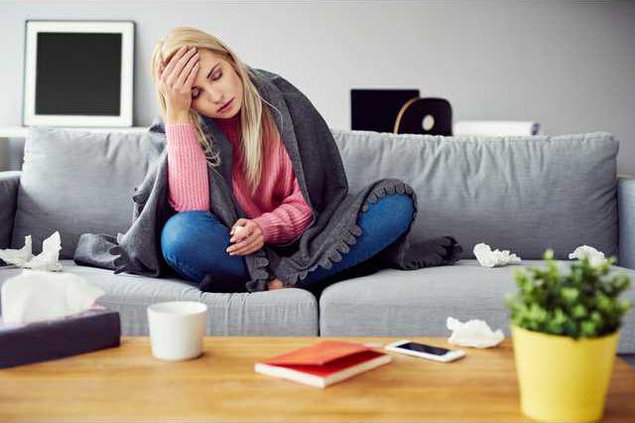As if getting your period wasnt bad enough, 176 million women worldwide also have to handle the symptoms of endometriosis. Its a condition where cells grow outside of your uterus instead of on the inside, as outlined by WebMD. Itd be fine of those cells were content to just hang out there, but unfortunately, they do their job and break apart and bleed, just like the rest of your uterine cells do at the end of your period. If you have endometriosis, these misplaced cells cause inflammation, swelling and scar tissues, and these eight symptoms:
1. Cramping
Most women experience cramps with their period, but with endometriosis, the pain is often described as killer cramps [that] do not go away with NSAIDS. The tissue that has formed outside of your uterus freezers tissues and muscles in place, making these areas less flexible, more swollen and can even cause inflammation, which creates extremely painful cramping.
2. Long periods
Doctor Tamer Seckin (founder and medical director of the Endometriosis Foundation of America (EFA)) outlines that your period shouldnt be longer than six days, but with endometriosis, periods can last for over a week.
3. Infertility
Health.com points out that 30 to 40 percent of women with this condition experience infertility or difficulty getting pregnant. Pain during intimacy is also a common symptom for those with endometriosis.
4. Back pain
Back pain is another common period symptom, but for those with endometriosis, it can last before, after and during your period exacerbated by the scar tissue thats formed by those wandering uterine cells.
5. Chest pain
LiveStrong highlights a unique variation of endometriosis. When these misplaced uterine cells lodge themselves in your chest causing chest pain, difficulty lying down and even can cause patients to cough up blood.
6. Painful urination
Remember those cells that are supposed to be in your uterus, but arent? If they find their way into your bladder, kidneys and urethra, you may experience this symptom (and others). According to Active Beat, other bladder related symptoms include bloody urine, pain in the kidneys, urgent need for urination, frequent urination and the inability to urinate.
7. Fatigue
Now, most women will experience fatigue (hello, busy work and home life), but endometriosis is also accompanied with symptoms like bloating, persistent nausea, diarrhea or constipation, according to the Mayo Clinic. These symptoms are especially persistent during your period.
8. Excessive bleeding
Lots of bleeding can lead to low iron levels (which may contribute to your fatigue). Bleeding in between your period (menometrorrhagia) is also a common symptom.
Doctors arent sure what causes endometriosis, but genetics may play a role. There is also no cure for endometriosis (even a hysterectomy cant eliminate the pain in some cases). But whatever the cause, women can opt for a couple treatment options, depending on the severity of their condition and what their life plans are.
WebMD suggests a hormone therapy to shrink the implants and possibly reduce pain, but if youd like to get pregnant, surgery or infertility treatment may be the best option. The Endometriosis Foundation of America also suggests pain relievers like NSAIDS, a low dose contraceptive and a copper IUD may also help but talking to your doctor will really give you the best treatment option.
1. Cramping
Most women experience cramps with their period, but with endometriosis, the pain is often described as killer cramps [that] do not go away with NSAIDS. The tissue that has formed outside of your uterus freezers tissues and muscles in place, making these areas less flexible, more swollen and can even cause inflammation, which creates extremely painful cramping.
2. Long periods
Doctor Tamer Seckin (founder and medical director of the Endometriosis Foundation of America (EFA)) outlines that your period shouldnt be longer than six days, but with endometriosis, periods can last for over a week.
3. Infertility
Health.com points out that 30 to 40 percent of women with this condition experience infertility or difficulty getting pregnant. Pain during intimacy is also a common symptom for those with endometriosis.
4. Back pain
Back pain is another common period symptom, but for those with endometriosis, it can last before, after and during your period exacerbated by the scar tissue thats formed by those wandering uterine cells.
5. Chest pain
LiveStrong highlights a unique variation of endometriosis. When these misplaced uterine cells lodge themselves in your chest causing chest pain, difficulty lying down and even can cause patients to cough up blood.
6. Painful urination
Remember those cells that are supposed to be in your uterus, but arent? If they find their way into your bladder, kidneys and urethra, you may experience this symptom (and others). According to Active Beat, other bladder related symptoms include bloody urine, pain in the kidneys, urgent need for urination, frequent urination and the inability to urinate.
7. Fatigue
Now, most women will experience fatigue (hello, busy work and home life), but endometriosis is also accompanied with symptoms like bloating, persistent nausea, diarrhea or constipation, according to the Mayo Clinic. These symptoms are especially persistent during your period.
8. Excessive bleeding
Lots of bleeding can lead to low iron levels (which may contribute to your fatigue). Bleeding in between your period (menometrorrhagia) is also a common symptom.
Doctors arent sure what causes endometriosis, but genetics may play a role. There is also no cure for endometriosis (even a hysterectomy cant eliminate the pain in some cases). But whatever the cause, women can opt for a couple treatment options, depending on the severity of their condition and what their life plans are.
WebMD suggests a hormone therapy to shrink the implants and possibly reduce pain, but if youd like to get pregnant, surgery or infertility treatment may be the best option. The Endometriosis Foundation of America also suggests pain relievers like NSAIDS, a low dose contraceptive and a copper IUD may also help but talking to your doctor will really give you the best treatment option.





